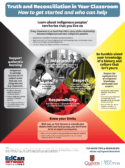How teachers can integrate Truth and Reconciliation in their classrooms
Infographic: How to get started and who can help
Download the poster. (3.58 MB / pdf)
Start the conversation with you colleagues and students.
DownloadTruth and Reconciliation in Your Classroom
This infographic aims to empower teachers, principals and administrators across Canada with four key steps to begin implementing truth and reconciliation initiatives immediately into K-12 classrooms.
Developed in collaboration with Dr. Kate Freeman and Dr. Lindsay Morcom from Queen’s University’s Faculty of Education, and Shawn McDonald of the Algonquin & Lakeshore Catholic District School Board, this quick-scan infographic outlines how educators can avoid cultural appropriation, prioritize authentic indigenous expertise, develop relationships with local Indigenous Elders and Knowledge Keepers, and build their own knowledge on the traditional territories that they live on. This infographic was inspired by a feature article that recently appeared in Education Canada Magazine.
The EdCan Network has also released a new Facts on Education fact sheet authored by renowned expert Dr. Pamela Rose Toulouse of Laurentian University, entitled How can we embed truth and reconciliation in every school?, which offers evidence-based strategies for how educators and students can bring this learning into our school communities.
In addition to the downloadable copy of the infographic, which can be posted in staff rooms and classrooms, here are several practical resources available to support teachers in building their knowledge and confidence on this subject matter.
RESOURCES FOR K-12 TEACHERS:
- Online sources like goodminds.com or the Martin Family Initiative feature hundreds of vetted resources by Indigenous authors with clear curriculum connections across many subject areas.
- Universities and other education institutions often have great resources online.
For the prairies, the University of Saskatchewan has an Indigenous Studies research portal.
In the Eastern Woodlands, Queen’s University has an outstanding website with Indigenous content.
On the West Coast, the University of British Columbia has K-12 curriculum resources available online. - Provincial teachers’ federations and other organizations may have resources specifically designed to assist teachers in their work to support truth and reconciliation education in their classrooms. For example, see Joining the Circle: An Educator’s Toolkit to Support First Nations, Métis and Inuit Students, published in hard copy in October 2017 by the Ontario Teachers’ Federation (OTF) and the Centre ontarien de prévention des agressions (COPA).
- For pan-Canadian topics like residential schools, check out the Hundred Years of Losseducation kit developed by the Legacy of Hope Foundation. The “Kairos Blanket Exercise” offers an interactive exploration of Indigenous-Canadian relations with a focus on residential schools and reconciliation. It can be used in any classroom from Grade 4 to adult learners.
FOR ADDITIONAL RESOURCES, SEE: NATIONAL CENTRE FOR TRUTH AND RECONCILIATION, UNIVERSITY OF MANITOBA (WWW.NCTR.CA)
If interested in placing a bulk order (20 or more) of the bilingual infographic please contact publications@edcan.ca for more information.
- Non-member rate: $2.75/each plus shipping and taxes.
- Member rate: $2.00/each plus shipping and taxes.

